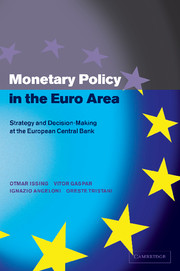Book contents
- Frontmatter
- Contents
- List of figures
- List of tables
- Acknowledgements
- Introduction
- 1 Money, output and prices: the scope of monetary policy
- 2 Monetary policy making: strategies and rules
- 3 The euro area: an overview
- 4 The ECB strategy: defining price stability
- 5 The role of money
- 6 A broadly based assessment
- 7 The ECB strategy: an overall view
- 8 The operational framework
- 9 Accountability and transparency
- 10 The single monetary policy in 1999
- Appendix Excerpts from ECB external communications to the press
- References
- Index
9 - Accountability and transparency
Published online by Cambridge University Press: 22 September 2009
- Frontmatter
- Contents
- List of figures
- List of tables
- Acknowledgements
- Introduction
- 1 Money, output and prices: the scope of monetary policy
- 2 Monetary policy making: strategies and rules
- 3 The euro area: an overview
- 4 The ECB strategy: defining price stability
- 5 The role of money
- 6 A broadly based assessment
- 7 The ECB strategy: an overall view
- 8 The operational framework
- 9 Accountability and transparency
- 10 The single monetary policy in 1999
- Appendix Excerpts from ECB external communications to the press
- References
- Index
Summary
Accountability and transparency have become increasingly important issues in the debate on central banking in recent years, alongside the growing degree of institutional independence enjoyed by central banks. In democratic societies, independence goes hand in hand with accountability, i.e. responsibility for the exercise of decision making powers granted through an act of delegation. Thus, while being granted independence, central banks are also made accountable for their outcomes through a number of statutory requirements. On a more general note, the need for transparency is also linked to the large degree of uncertainty that characterises monetary policy. In an uncertain environment, the central banks' assessment of current and future economic conditions is not self evident from the simple observation of their policy decisions. In order to be effective, monetary policy decisions must be understood as part of a more general monetary policy strategy. This implies a constant effort by the central bank to clarify, in a way understandable to the public at large, how its actions contribute to the attainment of its policy goals.
We take up the issue of accountability in section 9.1, beginning with a general discussion of its relationship to independence. The beneficial effects of the latter, both in theory and in the empirical evidence, are also summarised here. We then discuss how the general concept of accountability, which naturally pertains to the political sphere rather than to the economic one, has been ‘translated’ and interpreted in the academic literature on central banking.
- Type
- Chapter
- Information
- Monetary Policy in the Euro AreaStrategy and Decision-Making at the European Central Bank, pp. 128 - 143Publisher: Cambridge University PressPrint publication year: 2001

